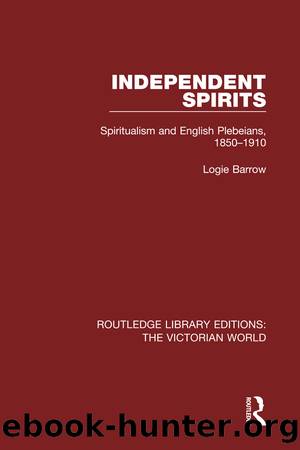Independent Spirits: Spiritualism and English Plebeians, 1850-1910 by Logie Barrow

Author:Logie Barrow [Barrow, Logie]
Language: eng
Format: epub
Tags: History, General, Europe, Great Britain, Modern, 19th Century
ISBN: 9781317268857
Google: 6x1qDAAAQBAJ
Goodreads: 828498
Publisher: Routledge
Published: 1986-01-01T00:00:00+00:00
This optimism may appear confused. But Skelton was not alone in apparently suffering from it at this time. Take J. F. Whiteâs report of a deputation (also during 1854) to the great Free Trade MP, John Bright, to present a botanic petition. True, deputation and recipient seem to have harangued or disdained each other in a very clear-cut way, as self-conscious representatives of the working and middle classes. And yet Whiteâs own arguments in this very context suggest a confused or vague strategy. On the one hand, âall great Reforms originate with working menâ, so that âwe shall soon be able to convince the middle class,⦠then they will take it up and it will become popularâ; on the other, âonly by seeing its effects on the working class [would] the middle class⦠adopt it.â Whatever Whiteâs precise politics had been during the previous fifteen or so years, Skeltonâs had, as noted, been social-Chartist. Even more relevant here, he had been a Chartist intellectual and strategically radical â part of what Goodway calls a âcoterie which included Thomas Cooper and Harney, John Skelton and [the later spiritualist] Thomas Shorterâ and, during the late 1840s, in agreement with Ernest Jonesâs identification of âthe middle classes [as]⦠our greatest enemiesâ.134 Apart, meantime, from Chartismâs decline as a national movement, one factor which may have confused his class strategy (if it now was) may have been a possible convergence between plebeian and some other unorthodox medics within the campaign against vaccination.
Any such convergence is worth some paragraphs. It would have occurred at a time when Skelton, at least, believed that not only was medical botany having a considerable impact,135 but also that its opponents were split. As to the first, he claimed, however exaggeratedly, that ânot a single city, town or village but what numbers its disciples [of medical botany] more or less. They support two periodicals, and have numerous works upon the subject.â136 (His âmore or lessâ may be a ploy to lump traditional herbalists together with Thomsonians and Eclectics.) We can add (as Skelton does not mention this) that there was from 1864 a National Association of Medical Herbalists which, we are told, âmany botanic societies, especially from the North and Midlands [of England], elected to joinâ.137 Medical botanists also drew succour from the USA, which had, Skelton claimed, ânot less than nine Thomsonian Colleges in her principal towns and citiesâ.138 Thus, the newly acquitted Josiah Thomas found himself presented, not merely with a purse of silver but also with an unsolicited honorary MD from the Eclectic Medical College of Pennsylvania, signed by J. R. Buchanan139 (the psychometrical Eclectic whom we met during Chapter 4). Six of the latterâs works were advertised within one particular issue of the Eclectic Journal.140 During the same weeks, âan immense quantity of American medical works, new as well as oldâ, was being offered for sale to medical botanists at below the American price.141 And Buchanan, at least, was apparently sending such works free: no wonder
Download
This site does not store any files on its server. We only index and link to content provided by other sites. Please contact the content providers to delete copyright contents if any and email us, we'll remove relevant links or contents immediately.
Becoming Supernatural by Dr. Joe Dispenza(8192)
Crystal Healing for Women by Mariah K. Lyons(7917)
The Witchcraft of Salem Village by Shirley Jackson(7245)
Inner Engineering: A Yogi's Guide to Joy by Sadhguru(6780)
The Four Agreements by Don Miguel Ruiz(6735)
The Power of Now: A Guide to Spiritual Enlightenment by Eckhart Tolle(5740)
Secrets of Antigravity Propulsion: Tesla, UFOs, and Classified Aerospace Technology by Ph.D. Paul A. Laviolette(5363)
The Wisdom of Sundays by Oprah Winfrey(5138)
Room 212 by Kate Stewart(5099)
Pale Blue Dot by Carl Sagan(4990)
Fear by Osho(4724)
The David Icke Guide to the Global Conspiracy (and how to end it) by David Icke(4693)
Animal Frequency by Melissa Alvarez(4456)
Rising Strong by Brene Brown(4441)
How to Change Your Mind by Michael Pollan(4343)
Sigil Witchery by Laura Tempest Zakroff(4231)
Man and His Symbols by Carl Gustav Jung(4118)
The Art of Happiness by The Dalai Lama(4118)
Real Magic by Dean Radin PhD(4118)
